What Are the Key Benefits of IMS Lead Auditor Training?

In the current business environment, companies aim to uphold elevated standards in quality, environmental stewardship, and safety in the workplace. Integrated Management System (IMS) Lead Auditor Training is essential for professionals to gain the skills required for effective auditing and system management. This training encompasses three key ISO standards: ISO 9001:2015 (Quality Management System), ISO 14001:2015 (Environmental Management System), and ISO 45001:2018 (Occupational Health and Safety Management System). Key Benefits of IMS Lead Auditor Training – Gain a Comprehensive Understanding of IMS – IMS Lead Auditor Training provides a thorough understanding of how ISO 9001, ISO 14001, and ISO 45001 integrate into a single framework. This holistic approach helps professionals streamline audits, reduce redundancy, and ensure compliance across multiple management systems efficiently. By learning how these standards interconnect, auditors can conduct assessments more effectively, ensuring organizations achieve continuous improvement while maintaining compliance with international standards. Enhance Career Opportunities – Certified IMS Lead Auditors are in high demand across various industries, including manufacturing, healthcare, construction, and IT services. Businesses worldwide seek qualified auditors to ensure their management systems comply with global standards and operate efficiently. With this certification, you can explore career opportunities as a: Lead Auditor for certification bodies Compliance Manager within an organization Quality, Health & Safety, and Environmental (QHSE) Consultant Internal Auditor for multinational companies This credential adds credibility to your profile, making you a valuable asset in the global job market. Develop Expertise in Risk-Based Thinking – IMS Lead Auditor Training equips professionals with risk-based auditing techniques. Understanding risk management is crucial for ISO 9001, ISO 14001, and ISO 45001 audits, as it helps organizations mitigate risks before they impact business operations. By applying risk-based thinking, auditors can: Identify and assess potential risks in quality, environmental, and safety management. Recommend effective control measures. Improve business resilience and sustainability. Improve Internal Audit Capabilities – Organizations that conduct internal audits benefit from having trained IMS Lead Auditors on their team. This training enhances internal auditing skills by teaching professionals how to: Conduct systematic, objective, and evidence-based audits. Identify gaps and areas for improvement. Ensure compliance with regulatory and standard requirements. This leads to more efficient operations, cost savings, and improved stakeholder confidence. Boost Organizational Compliance & Performance –A well-audited Integrated Management System ensures that businesses not only comply with regulations but also improve overall performance. Certified IMS Lead Auditors contribute to: Enhancing customer satisfaction through quality management (ISO 9001). Promoting environmental sustainability (ISO 14001). Ensuring workplace safety and reducing hazards (ISO 45001). These improvements lead to increased efficiency, productivity, and corporate responsibility, making organizations more competitive in the global market. Stay Updated with International Standards – ISO standards evolve to meet changing business needs and regulatory requirements. IMS Lead Auditor Training ensures professionals stay updated with the latest auditing techniques, industry best practices, and compliance frameworks. By staying current, auditors can provide more accurate assessments and help businesses remain compliant with new regulatory changes. Build Confidence in Auditing & Reporting – One of the most significant benefits of this training is the ability to conduct audits with confidence and professionalism. Participants learn: How to prepare for and conduct audits. Effective communication and reporting techniques. How to manage audit findings and corrective actions. Strong auditing and reporting skills ensure that businesses receive clear and actionable insights from audits, leading to continuous improvement. Upcoming IMS Lead Auditor Training Schedule If you are looking to advance your career and gain globally recognized certification, don’t miss the upcoming IMS Lead Auditor Training: 🗓️ Dates: April 7th, 8th, 10th, 11th, 12th, and 13th, 2025 ⏰ Time: 10:30 AM – 5:30 PM IST (Daily) 📍 Mode: Live Online Training This training is an excellent opportunity for professionals looking to boost their expertise in ISO 9001, ISO 14001, and ISO 45001 auditing. Conclusion IMS Lead Auditor Training is a valuable investment for professionals seeking to build a strong foundation in quality, environmental, and occupational health & safety management. It offers numerous career benefits, enhances auditing skills, and improves compliance and business performance. Whether you are an aspiring auditor, quality manager, or compliance professional, this training will empower you with the knowledge and skills to conduct effective audits and drive organizational excellence. If you’re ready to take your auditing skills to the next level, consider enrolling in the IMS Lead Auditor Training today!
Why Your Organization Needs ISO Lead Auditor Training in 2025?

In today’s competitive business world, maintaining high standards of quality, environmental management, and occupational health and safety is crucial. Organizations worldwide strive to comply with international standards to enhance credibility, improve efficiency, and minimize risks. One of the best ways to achieve this is by investing in ISO Lead Auditor Training for your team. If you are looking to strengthen your organization’s compliance with ISO 9001 (Quality Management System), ISO 14001 (Environmental Management System), and ISO 45001 (Occupational Health & Safety Management System), attending an Integrated Management System (IMS) Lead Auditor Training is a must in 2025. What is ISO Lead Auditor Training? ISO Lead Auditor Training is a comprehensive course designed to equip professionals with the skills needed to perform first-party, second-party, and third-party audits against ISO standards. The training provides a deep understanding of audit principles, methodologies, and best practices, enabling participants to lead audits efficiently within their organization or as independent auditors. Why Should Your Organization Invest in IMS Lead Auditor Training? Stay Ahead in Compliance and Certification – Regulatory requirements and industry standards are constantly evolving. By undergoing ISO Lead Auditor training, your organization ensures it remains compliant with the latest ISO 9001, ISO 14001, and ISO 45001 requirements. This helps in avoiding non-conformities, legal penalties, and operational disruptions. Enhance Organizational Efficiency and Process Improvement – ISO audits help identify inefficiencies and gaps within business processes. Lead auditors trained in IMS can assess these gaps and suggest necessary improvements, ensuring optimized operations, reduced waste, and cost savings. Strengthen Risk Management & Workplace Safety – ISO 45001 focuses on occupational health and safety, ensuring that workplaces remain secure and free from hazards. Lead auditors play a crucial role in conducting risk assessments and helping organizations implement preventive measures to protect employees from potential workplace incidents. Build Customer Trust & Gain Competitive Advantage – Companies certified with ISO 9001, ISO 14001, and ISO 45001 gain a competitive edge in the market. Customers prefer working with businesses that prioritize quality, environmental responsibility, and employee safety. A strong audit team ensures these certifications are maintained, boosting your organization’s reputation and trustworthiness. Develop Internal Expertise & Reduce External Audit Costs – Hiring external auditors for compliance assessments can be expensive. By training in-house auditors, companies can conduct internal audits, pre-certification audits, and continuous compliance checks, significantly reducing costs while maintaining high standards. Improve Sustainability and Environmental Performance – With growing concerns about climate change and environmental impact, organizations are under pressure to adopt sustainable business practices. ISO 14001 provides a structured framework for environmental management. A trained lead auditor ensures compliance with green initiatives, helping your organization reduce its carbon footprint and achieve sustainability goals. Career Growth and Professional Development – For individuals, obtaining an ISO Lead Auditor Certification is a significant career boost. Certified auditors are in high demand across industries, as organizations increasingly seek professionals who can lead audits and ensure compliance with international standards. Upcoming IMS Lead Auditor Training Schedule If you want to equip your team with IMS Lead Auditor skills, now is the perfect time to enroll in our upcoming training program. 📅 Training Dates: 7th, 8th, 10th, 11th, 12th, and 13th April 2025 ⏰ Time: 10:30 AM – 5:30 PM IST (Every day) 📍 Mode: Online / In-Person (Based on preference) Enroll Now –https://www.siscertifications.com/training-form/ Conclusion Investing in ISO Lead Auditor Training is a strategic move that benefits both organizations and professionals. As businesses navigate an increasingly regulated and competitive environment in 2025, having a trained audit team ensures compliance, efficiency, and long-term success. Don’t MISS OUT on this opportunity to upgrade your organization’s audit capabilities and enhance your professional growth. Register Now and take a step towards excellence in quality, environmental, and occupational health and safety management system! For Registration : – 📞 Contact Us: +91-8882213680 🌐 More Info : https://www.siscertifications.com/iso-training/ 📧 Email: [email protected]
The Benefits of ISO/IEC 42001:2023 in the Emerging AI Landscape

As artificial intelligence (AI) continues to reshape industries, the need for robust governance and ethical development has never been more critical. ISO/IEC 42001:2023, the first international AI management system standard, provides a structured approach for organizations to manage AI risks, ensure compliance, and foster responsible innovation. What is ISO/IEC 42001:2023 Certification? ISO/IEC 42001:2023 certification is an internationally recognized standard that provides a framework for managing artificial intelligence (AI) systems responsibly, ethically, and securely. It is the first AI-specific management system standard developed by the International Organization for Standardization (ISO) to help organizations implement best practices for AI governance, risk management, and compliance. How ISO/IEC 42001:2023 Improves AI Governance Frameworks? Artificial Intelligence (AI) governance is essential for organizations aiming to build trustworthy and transparent AI systems. ISO/IEC 42001:2023 improves AI governance frameworks by offering standardized guidelines that help businesses establish policies, procedures, and controls to mitigate AI-related risks. This structured approach ensures that AI systems align with ethical principles, regulatory requirements, and industry best practices, fostering greater accountability. Why ISO/IEC 42001:2023 Is Essential for AI Risk Management? The unpredictable nature of AI introduces several risks, including bias, security vulnerabilities, and unintended consequences. ISO/IEC 42001:2023 is essential for AI risk management as it provides a systematic method for identifying, assessing, and mitigating these risks. Organizations adopting this standard can proactively address challenges by ensuring that AI applications remain safe, reliable, and compliant with global regulations. ISO/IEC 42001:2023 Compliance for AI-Driven Organizations For AI-powered businesses, compliance with industry standards is not just a regulatory requirement—it is a competitive advantage. ISO/IEC 42001:2023 compliance for AI-driven organizations ensures that companies adhere to international best practices, reducing legal liabilities and enhancing stakeholder trust. Whether in healthcare, finance, or manufacturing, ISO/IEC 42001:2023 helps businesses maintain AI integrity while meeting customer expectations. How ISO/IEC 42001:2023 Supports Responsible AI Innovation? Innovation in Artificial Intelligence (AI) must be balanced with responsibility to avoid ethical concerns and unintended consequences. ISO/IEC 42001:2023 supports responsible AI innovation by encouraging organizations to implement transparency, accountability, and fairness in AI development. This ensures that AI solutions are designed and deployed in a manner that prioritizes human rights, security, and social responsibility. ISO/IEC 42001:2023 Certification for AI Startups For AI startups looking to establish credibility and gain investor confidence, certification is crucial. ISO/IEC 42001:2023 certification for AI startups demonstrates commitment to quality, security, and ethical AI practices. By adopting this standard early, startups can position themselves as industry leaders and gain a competitive edge in the rapidly evolving AI landscape. Impact of ISO/IEC 42001:2023 on AI Transparency and Accountability One of the major concerns surrounding AI is the lack of transparency and accountability. The impact of ISO/IEC 42001:2023 on AI transparency and accountability is significant, as the standard mandates clear documentation, explainability, and traceability of AI decision-making processes. This ensures that AI systems are interpretable, reducing the risk of unintended bias or discriminatory outcomes. Why AI Companies Need ISO/IEC 42001:2023 Certification? With increasing scrutiny on AI ethics and compliance, businesses must take proactive measures to establish credibility. Why AI companies need ISO/IEC 42001:2023 certification is clear—it serves as a mark of trust, demonstrating that an organization follows internationally recognized best practices for AI governance, risk management, and ethical development. This certification can also enhance partnerships, regulatory acceptance, and market reputation. Conclusion As AI continues to evolve, the need for standardized governance, risk management, and ethical compliance becomes increasingly important. ISO/IEC 42001:2023 provides a comprehensive framework to address these challenges, ensuring responsible AI development, transparency, and accountability. Whether you’re a startup, enterprise, or regulatory body, adopting ISO/IEC 42001:2023 can drive long-term success in the AI landscape
Understanding PCI DSS: Essential Insights for Businesses to Ensure Payment Security

In today’s digital economy, where online transactions are prevalent, guaranteeing payment data security has become critical. Businesses of all sizes has to to comply to high security standards with the goal to protect client data from potential breaches. Among these standards, the Payment Card Industry Data Security Standard (PCI DSS) is a critical framework for protecting payment information. In this blog, we’re going to take a peek at what PCI DSS is, why it’s important, what its basic requirements are, and how organizations can overcome challenges to achieve compliance effectively. Introduction to PCI DSS: What You Need to Know The Payment Card Industry Data Security Standard (PCI DSS) is an internationally recognized set of security standards that ensure, businesses handle cardholder data securely. PCI DSS, created by major credit card companies such as Visa, Mastercard, and American Express, seeks to prevent fraud and data breaches in payment card transactions. Whether you’re a small retailer or a large e-commerce platform, complying with PCI DSS is not only a regulatory requirement, but also a critical step toward maintaining customer trust. Noncompliance with PCI DSS may lead to serious consequences, such as large fines, reputational damage, and loss of customer loyalty. As a result, understanding and implementing PCI DSS requirements is critical for businesses handling payment card data. The Core Requirements of PCI DSS: A Breakdown of Each Requirement Here’s a simple breakdown of PCI DSS core requirements :- Create and maintain a secure network – Set up and maintain a firewall to safeguard cardholder data. Refrain from using vendor-supplied default passwords and security settings. Protect cardholder data – Encrypt cardholder data for transmission over public networks. Use strong encryption and tokenization techniques to secure stored data. Maintain a vulnerability management program – Regularly update anti-virus software. Ensure system and application security by promptly applying patches. Implement Strong Access Control Measures – Restrict cardholder data access to only those who need to know. Assign unique IDs to all computer users. Regularly monitor and test networks – Monitor access to network resources and cardholder data. Conduct frequent security testing to detect weaknesses. Maintain an information security policy – Implement a comprehensive security policy that covers all elements of data protection. By following these policies, organizations can build a strong foundation to protect payment data from illegal access. The Importance of PCI DSS Compliance for Businesses of All Sizes Fulfilling PCI DSS standards serves two essential purposes because it builds customer confidence while supporting ongoing business success. Here’s why compliance matters: Protecting Customer Trust: Businesses which focus on protecting customer data build stronger trust with their customers who will choose to make transactions. Payment data security receives the highest priority from businesses which follow PCI DSS compliance practices. Avoiding Financial Penalties: Failure to meet payment card network requirements leads to large financial penalties that small businesses and enterprises must bear. Mitigating Risks: The implementation of compliance reduces the chance of data breaches preserving your organization from financial penalties as well as harm to its reputation. Staying Competitive: Proof of PCI DSS compliance is mandatory for business agreement initiation with partners and customers therefore demonstrating achievement of PCI DSS standards becomes necessary for maintaining market competitiveness. Small businesses alongside large corporations gain operational protection and customer relationship enhancement by following PCI DSS standards. Common Challenges in Achieving PCI DSS Compliance and How to Overcome Them While the advantages of PCI DSS compliance are obvious, achieving it is not without difficulty. Here are some frequent challenges and how to overcome them: Cost of Compliance: Implementing appropriate security measures can be expensive, particularly for small firms. Solution: Invest in scalable compliance solutions based on your business size and needs. Consider cloud-based services for lower infrastructure costs. Complexity of requirements: The 12 requirements might be onerous, especially for organizations that lack specialized IT personnel. Solution: Work with professional consultants or Managed Security Service Providers (MSSPs) to guide you through the compliance process. Employee Awareness: Human mistake plays a big role in data breaches. Solution: Conduct frequent training sessions to educate staff on data security best practices and their role in compliance. Keeping Up with Updates: As PCI DSS rules evolve to meet new security threats, maintaining compliance becomes increasingly difficult. Solution: Utilize automated monitoring and reporting technologies to stay up-to-date on requirements. By confronting such challenges head on, businesses may shorten their compliance journey and defend themselves from evolving risks. The Role of Technology in Facilitating PCI DSS Compliance Efforts Businesses need technology infrastructure to achieve PCI DSS compliance because it serves as a critical element throughout their compliance journey. Here’s how: PCI DSS Tools and Software Solutions: A wide range of software tools is available to help organizations address compliance requirements using vulnerability scanners while providing encryption tools and access control systems. Automated Compliance Processes: The implementation of automation enables safe operations through the process optimization of logging requirements and system monitoring and reporting responsibilities. Monitoring and Reporting Solutions: Real-time network activity visibility from modern monitoring tools allows companies to identify security threats so businesses can respond instantly. Secure Payment Gateways: Businesses that adopt secure payment gateways equipped with PCI DSS compliance features reduce their workload substantially Businesses benefit from both regulatory compliance and enhanced operational security when they dedicate funds towards appropriate technological solutions. Conclusion: Taking Action Towards Achieving PCI DSS Compliance In an era of constant cyber threats, obtaining PCI DSS compliance is no longer optional for organizations that handle payment data. Businesses can provide a secure environment for their consumers and reduce the risk of data breaches by understanding the basic requirements, tackling common obstacles, and using technology. Taking action now to prioritize PCI DSS compliance will not only prevent your company’s financial and reputational risks, but will also foster customer trust, assuring long-term growth
The Importance of ISO Certification for Businesses in Bahrain’s Major Cities
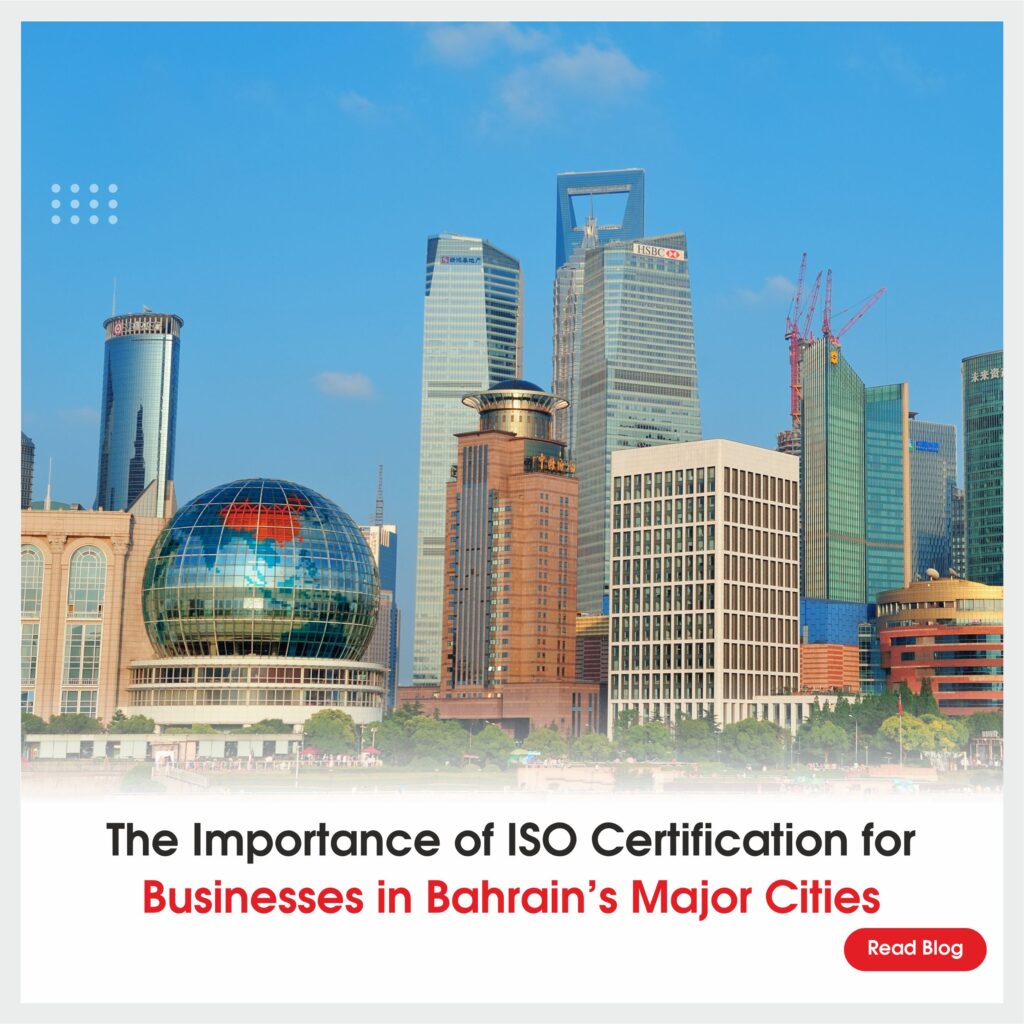
Understanding Bahrain—A Gateway to the Gulf The Kingdom of Bahrain, located in the heart of the Arabian Gulf, is a small yet powerful nation acknowledged for its rich history, thriving economy, and significant geographical location. Bahrain has a history of almost 5,000 years as a center for trade, culture, and invention. Its name, which translates to “two seas,” reflects the archipelago’s distinctive environment, which includes 33 islands. Bahrain’s prosperity depends on its oil gas production combined with its finance industry tourism sector and manufacturing operations. Despite its limited space Bahrain has built itself into a major financial center for the Middle East that draws business and investment worldwide. Bahrain shows its dedication to future growth through the modern strategies it implements with its business initiatives. Let us take a closer look at Bahrain’s major cities to discover how they contribute to the country’s development Manama is Bahrain’s capital city and financial powerhouse. It serves as a commercial and international trade hub, housing some of the region’s top financial institutions. Muharraq, known for its bustling souq and as a center of traditional arts and music, represents Bahrain’s cultural history. Hamad Town, located near Sakhir, is well-known for its close proximity to the Bahrain International Circuit, the Middle East’s largest Formula One racing circuit. Riffa is Bahrain’s second-largest city, division into East Riffa, West Riffa, and North Riffa. It offers a blend of modern and traditional lives. A’ali is a prominent town in northern Bahrain, known for its football club and cultural significance. As Bahrain develops as a corporate and cultural hub, firms must find ways to differentiate themselves in this competitive environment. ISO certification is a tried-and-true method for accomplishing this goal. The Role of ISO Certification in Bahrain’s Competitive Market International Organization for Standardization certification helps companies prove they uphold quality standards and use safe practices that boost efficiency with a focus on sustainable practices. ISO certification gains momentum in Bahrain across all sectors including manufacturing and construction along with healthcare and IT companies. Here’s how ISO certification can enhance your competitive edge in Bahrain: Building Credibility and Trust – Trust stands central as an essential element in Bahrain’s busy business landscape. ISO certification makes your organization stand out to everyone who works with you by letting them know you follow global quality guidelines. ISO 9001 shows your quality commitment and ISO 14001 proves your environmental responsibility. When you get certified under international standards your business builds greater market value and attracts business relationships. Improving Operational Efficiency – ISO standards help organizations create faster and more effective methods of work. Organizations improve how they use their resources and operate better when they follow ISO standards. The occupational health and safety standard ISO 45001 leads companies to lower workplace injuries and boosts employee contentment. ISO standards help Bahraini companies run their operations more profitably and better compete in their quick-paced business setting. Facilitating Market Expansion – Bahrain serves as a starting point for GCC member countries and worldwide connections. Companies that want to grow their business operations can use ISO certification as their international access key. International clients and business partners from all over the world need suppliers that have met ISO standards so organizations must get certified to access new markets and win global partnerships. Ensuring Compliance with Regulations – Bahrain follows strict regulations that protect both customers and the environment through quality-approved products and services. ISO certifications support companies in meeting government standards so they can dodge legal penalties. ISO/IEC 27001 certification helps businesses protect sensitive data while meeting requirements for data protection laws. Enhancing Customer Satisfaction – In a consumer-driven market like Bahrain, satisfaction among customers plays an essential role for success. ISO standards aim to emphasize customer needs by assuring consistent quality and service delivery. Businesses that implement ISO 9001 or other related standards can improve client experiences, resulting in improved loyalty and positive word-of-mouth. ISO Certification Across Major Cities in Bahrain Every significant city in Bahrain offers special business advantages with specific market conditions. Here’s how ISO certification can benefit organizations in these cities: Manama: The Financial Hub – Bahrain’s financial institutions and multinational companies stand together beside towering structures in the country’s leading business hub. Organizations across Manama’s business district need information security (ISO/IEC 27001) and quality management (ISO 9001) certifications to thrive effectively. Financial institutions use these certifications to strengthen data protection while improving operational performance and winning client trust. Muharraq: The Cultural Heart – As a destination for art and culture Muharraq stands as the main area for heritage tourism and local market businesses. ISO 14001 and ISO 45001 standards provide Muharraq businesses ways to make their operations more sustainable while protecting worker safety. Organizations in these sectors benefit significantly from obtaining these quality certifications. Hamad Town: The Gateway to Motorsport – The Bahrain International Circuit neighbourhood location positions Hamad Town as the heart of motorsports and related professional services. Enterprises working in event management, logistics and engineering need ISO 9001 (Quality Management) and ISO 45001 (Occupational Health and Safety) certifications for success in this industry sector. These quality system standards help organizations maintain good operation standards and better excel at serving their clients. Riffa: The Growing City – As Bahrain’s second-biggest city Riffa combines areas where people live with business zones and cultural centers. Businesses in Riffa should get ISO 22000 (Food Safety Management) when they serve food and drink clients while getting ISO 50001 (Energy Management) if they focus on sustainable practices. Certifications assist businesses in following worldwide and domestic requirements to succeed better in their markets. A’ali: The Cultural and Sports Hub – A’ali’s cultural significance and sporting events make it an appealing site for companies in such sectors. ISO certifications, such as ISO 20121 (Event Sustainability Management), can assist organizations in planning and implementing sustainable events. Furthermore, ISO 45001 helps protect the safety of participants and employees at major gatherings and sporting events. Steps to Achieve ISO Certification in Bahrain
Achieving ISO Certification: A Strategic Advantage for Major Cities in Bahrain
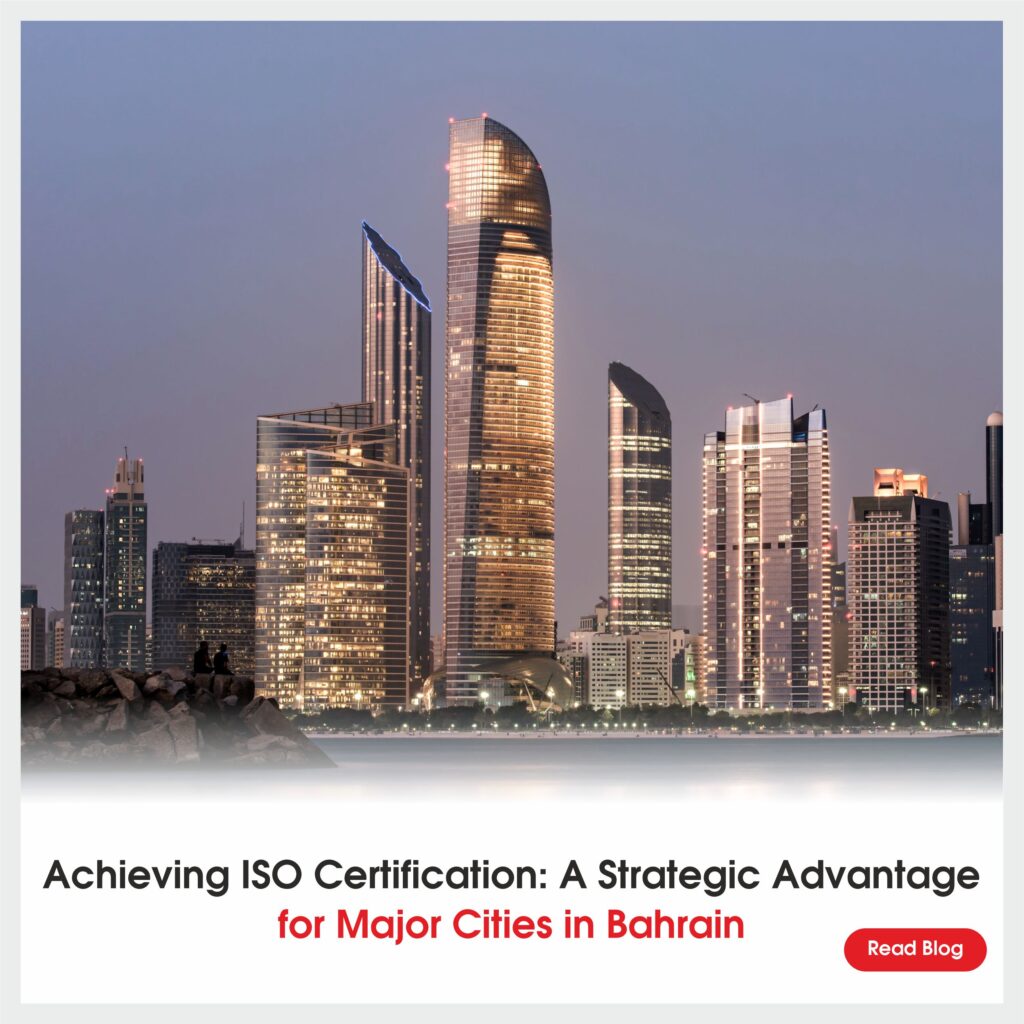
Bahrain, an economically stable island nation in the Arabian Gulf, has evolved as a major business center in the Middle East. With its strategic position, investor-friendly rules, and quickly rising economy, the country is an ideal place for enterprises to thrive. Many Bahraini businesses are adopting ISO certifications to increase their credibility and operational efficiency. These certifications not only ensure conformity with international standards, but they also provide access to worldwide markets, promote growth, and increase customer trust. Understanding ISO Certification ISO (International Organization for Standardization) certification is a worldwide recognized standard that guarantees organizations run smoothly, safely, and sustainably. It assists companies in improving their quality management, information security, and environmental impact, among other things. Some of the most popular ISO certifications in Bahrain include: ISO 9001: 2015 – Quality Management System ISO 14001: 2015 Environmental Management System ISO 45001: 2018 – Occupational Health and Safety Management System. ISO/IEC 27001:2022- Information Security, Cybersecurity and Privacy Protection — Information Security Management System ISO 22000: 2018 – Food Safety Management System These certifications enable organizations to enhance internal processes, meet regulatory requirements, and obtain a competitive advantage in local and international markets. A Brief History of Bahrain Bahrain has a rich history that dates back thousands of years. It was home to the ancient Dilmun civilization, one of the region’s oldest trading centers. Bahrain has evolved over the ages into a vibrant financial and commercial center, attracting global investors due to its open economy and business-friendly legislation. The country’s economic diversification policy prioritizes areas like as banking, tourism, manufacturing, and logistics, making ISO certifications essential for businesses seeking to maintain high standards and competitiveness. ISO Certification Across Major Cities in Bahrain Sitra : Oil and Export Hub Sitra, a significant oil port, is essential for Bahrain’s economy. It handles the country’s petroleum exports and acts as a vital export hub for oil resources in northeastern Saudi Arabia. ISO accreditation is required by oil and gas companies to verify compliance with worldwide safety and quality requirements. ISO 45001 enables organizations in Sitra to improve workplace safety in oil refineries and petrochemical plants. ISO 14001 ensures that oil and gas companies operate in an environmentally conscious manner. ISO 9001 enhances operational efficiency and quality control in the oil production and export operations. Jidhafs : market of textiles and pottery. Jidhafs is noted for its bustling markets, which draw visitors with its high-quality fabrics and traditional pottery. ISO accreditation benefits businesses in this industry by ensuring product quality, safety, and sustainability. ISO 9001 enables textile and pottery organizations to improve product consistency and satisfy consumer expectations. ISO 14001 encourages sustainable production processes that reduce environmental impact. ISO 22000 is useful for organizations who deal with food-related pottery, since it ensures product safety and cleanliness. Isa Town: The Education and Retail Hub. Isa Town is home to several private schools as well as a thriving traditional marketplace. ISO certification is critical for maintaining high standards in the education and retail industries. ISO 21001 guarantees that educational institutions use quality management systems to improve learning outcomes. ISO 9001 enables retail businesses to improve service quality and client satisfaction. ISO/IEC 27001 is required for schools and organizations dealing with digital information to ensure data security and protection. Budaiya – The Fertile Agricultural Region Budaiya is one of Bahrain’s most fertile territories, renowned for its freshwater springs and agricultural activity. The farming industry in this region benefits substantially from ISO certification, which ensures food safety and sustainability. ISO 22000 ensures safe food manufacturing and distribution methods. ISO 14001 assists farmers and agricultural enterprises in implementing environmentally friendly practices to conserve natural resources. ISO 9001 improves quality management in the agriculture supply chain and food processing industries. Diraz: A Major Residential and Commercial Center Diraz is one of the most populous communities on Bahrain’s northwest coast, with a significant residential and commercial presence. Businesses in Diraz can use ISO certification to guarantee quality, safety, and regulatory compliance. ISO 9001 assists retailers, construction companies, and service providers by increasing efficiency and consumer satisfaction. ISO 45001 assists construction organizations in providing safe working conditions and reducing workplace dangers. ISO/IEC 27001 is critical for IT and digital organizations in Diraz to provide cybersecurity and data protection. Benefits of ISO Certification for Businesses in Bahrain ISO certification offers several benefits to organizations in Bahrain across a variety of industries. Some of the fundamental benefits are: ISO certification enhances a company’s credibility and reputation by demonstrating its dedication to quality, safety, and client satisfaction. Regulatory Compliance – Businesses can ensure that they comply with national and international regulations, lowering legal risks. Increased Efficiency – Using ISO standards streamlines operations, reduces waste, and optimizes resources. Access to Global Markets – Many foreign clients and partners prefer to engage with ISO-certified organizations, which opens up new options. Improved Customer Satisfaction – ISO standards prioritize quality and customer service, resulting in greater trust and loyalty. Better Risk Management: ISO frameworks assist organizations in identifying and mitigating risks, thereby ensuring long-term growth. How to Get ISO Certification in Bahrain The process of acquiring ISO certification in Bahrain consists of many essential steps: Determine the Relevant ISO Standard – Businesses must determine whether ISO certifications are appropriate for their industry and goals. Gap Analysis – Evaluate current processes and find areas for improvement to meet ISO requirements. Implementation – creating and implementing the required policies, procedures, and training programs to ensure ISO compliance. Internal Audit – Conduct an internal audit to assure preparation for certification. External Audit and certification – Hire an approved certifying body to conduct a formal audit and issue the ISO certificate after compliance. Continuous Improvement – Maintain compliance by conducting frequent audits and updating ISO standards. Conclusion ISO certification serves as a significant asset for businesses in Bahrain, allowing them to attain operational excellence, meet regulatory standards, and gain worldwide acknowledgment. Regardless of whether it’s in the
Understanding ISO 14001 Certification in Saudi Arabia
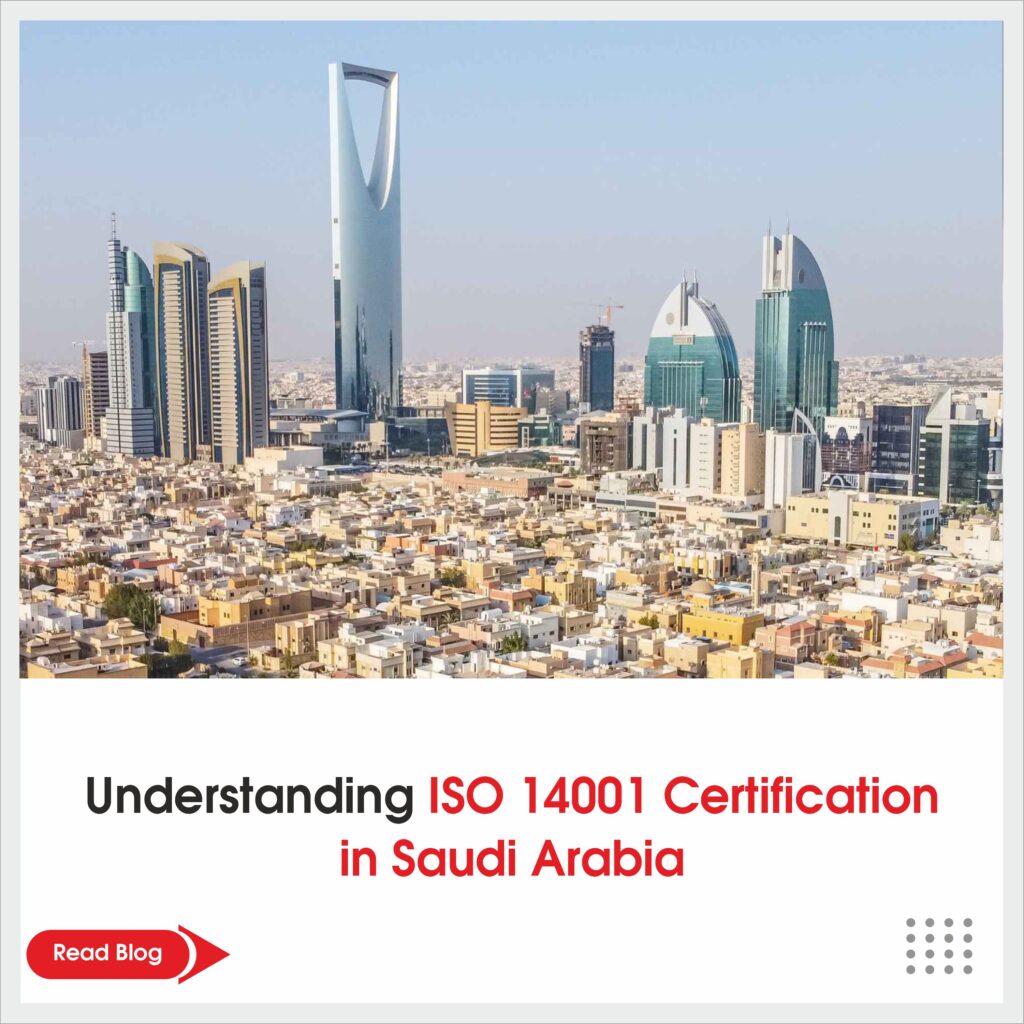
ISO 14001 Certification is a globally acknowledged standard that defines the requirements for a successful environmental management system (EMS). In Saudi Arabia, securing this certification is growing in significance for organizations aiming to showcase their dedication to environmental sustainability and adherence to regulatory standards. The ISO 14001 standard offers a structure that assists organizations in recognizing, controlling, observing, and enhancing their environmental performance. It motivates businesses to evaluate how their activities affect the environment and to adopt strategies to reduce any adverse impacts. This involves handling waste, minimizing energy usage, and guaranteeing sustainable resource management. In Saudi Arabia, companies in different sectors are embracing ISO 14001 Certification to improve their operational effectiveness as well as to satisfy the demands of stakeholders who emphasize sustainability. The certification process entails a comprehensive assessment of an organization’s EMS conducted by licensed third-party auditors. After obtaining certification, organizations need to consistently oversee and enhance their systems to ensure adherence to the standards established by ISO. Obtaining ISO 14001 Certification can additionally offer competitive benefits in the marketplace. It boosts a company’s standing with consumers who are more conscious of environmental matters and prefer brands that exhibit corporate social responsibility. Moreover, it could result in savings by managing resources more efficiently. Preparing for ISO 14001 Certification in KSA for environmental management system Preparing for ISO 14001 Certification in the Kingdom of Saudi Arabia (KSA) requires a methodical strategy for establishing a successful environmental management system (EMS). Organizations need to first grasp the criteria established by the ISO 14001 standard, which highlights ongoing enhancement and adherence to environmental laws. The first step entails performing an extensive gap analysis to recognize current practices and areas needing improvement. This examination must include every facet of the organization’s activities that affect the environment. Subsequently, it is essential to create an environmental policy that demonstrates the organization’s dedication to sustainability and adherence to regulations. Training workers on EMS concepts and practices proves essential for building an environmentally conscious culture inside the organization. Furthermore, companies should put in place procedures for monitoring, measuring, and assessing their environmental performance against predetermined goals. Documentation is critical to getting ISO 14001 certification; hence, reliable records of processes, rules, and performance indicators are required. Engaging with stakeholders throughout the process helps boost credibility and support. In the end, companies must plan for an external audit by a qualified authority to ensure that their EMS meets ISO 14001 criteria. By following these rules, businesses in Saudi Arabia can not only gain accreditation but also positively contribute to the region’s environmental sustainability efforts. Achieving ISO 14001 Certification for environmental management system Achieving ISO 14001 certification for an environmental management system (EMS) is a significant step towards enhancing your organization’s sustainability practices. This internationally recognized standard provides a framework for managing environmental responsibilities effectively, ensuring that organizations minimize their negative impact on the environment. To begin the certification process, organizations must first establish an EMS that aligns with the ISO 14001 requirements. This involves conducting a thorough assessment of current environmental practices, identifying areas for improvement, and setting measurable objectives. Engaging stakeholders and promoting awareness throughout the organization is crucial to foster a culture of environmental responsibility. Once the EMS is in place, organizations must implement it consistently while monitoring performance through regular audits and reviews. These evaluations help identify non-conformities and areas requiring corrective actions. After demonstrating compliance with ISO 14001 standards over time, organizations can proceed to undergo an external audit by a certified body. Achieving ISO 14001 certification not only enhances an organization’s reputation but also leads to improved regulatory compliance, reduced waste management costs, and increased operational efficiencies. Furthermore, it signals to customers and stakeholders that your organization is committed to sustainable practices and continuous improvement in environmental performance. Step-by-Step Implementation Process Steps to Implement ISO 14001: A Comprehensive Guide Implementing ISO 14001, the worldwide renowned Environmental Management System (EMS) standard, necessitates a structured approach to achieve optimal environmental performance and compliance. This is how the process works: Establishing Context – The first step is to understand the organization’s environmental goals, regulatory obligations, and operational implications. It is critical to define the scope of the EMS and establish clear guidelines for its execution. Identifying environmental aspects and impacts – Organizations must analyze their activities, products, and services to determine how they interact with the environment. This includes assessing energy use, waste output, emissions, and resource consumption to estimate their possible environmental impact. Conducting Risk and Opportunity Assessments – Analyze the risks and opportunities associated with environmental issues, such as compliance duties and potential improvements. This stage aids in prioritizing measures to reduce risks and capitalize on opportunities to improve environmental performance. Draft an Environmental Management Plan – Based on the evaluation, an actionable strategy is developed to address major environmental issues. This strategy outlines the objectives, targets, and measures for effectively managing impacts. It also entails delegating tasks and responsibilities to maintain responsibility. Implementing Controls and Procedures – Build systems and controls to manage environmental risks. This includes putting rules in place to manage waste, increase energy efficiency, avoid pollution, and conserve resources. Compliance with legal and regulatory obligations is a top priority at this time. Creating Awareness and Training Employees – Employee involvement is critical to the success of an EMS. Conduct training programs to educate employees on their roles in achieving environmental goals. Topics such as waste separation, energy conservation, and emergency response protocols should be addressed. Conducting Internal Audits – Regular internal audits assist ensure that the EMS is functioning properly and meeting ISO 14001 requirements. These audits uncover gaps, non-conformances, and areas for continual improvement. Management Review – Top management is important in reviewing the EMS. Periodic assessments ensure that the system stays successful, in line with the organization’s aims, and adaptable to changes in regulatory or operational situations. Implementing ISO 14001 aids organizations in minimizing their environmental effects, enhancing operational efficiency, and showcasing dedication
The Importance of ISO Certification for Companies in the GCC Region
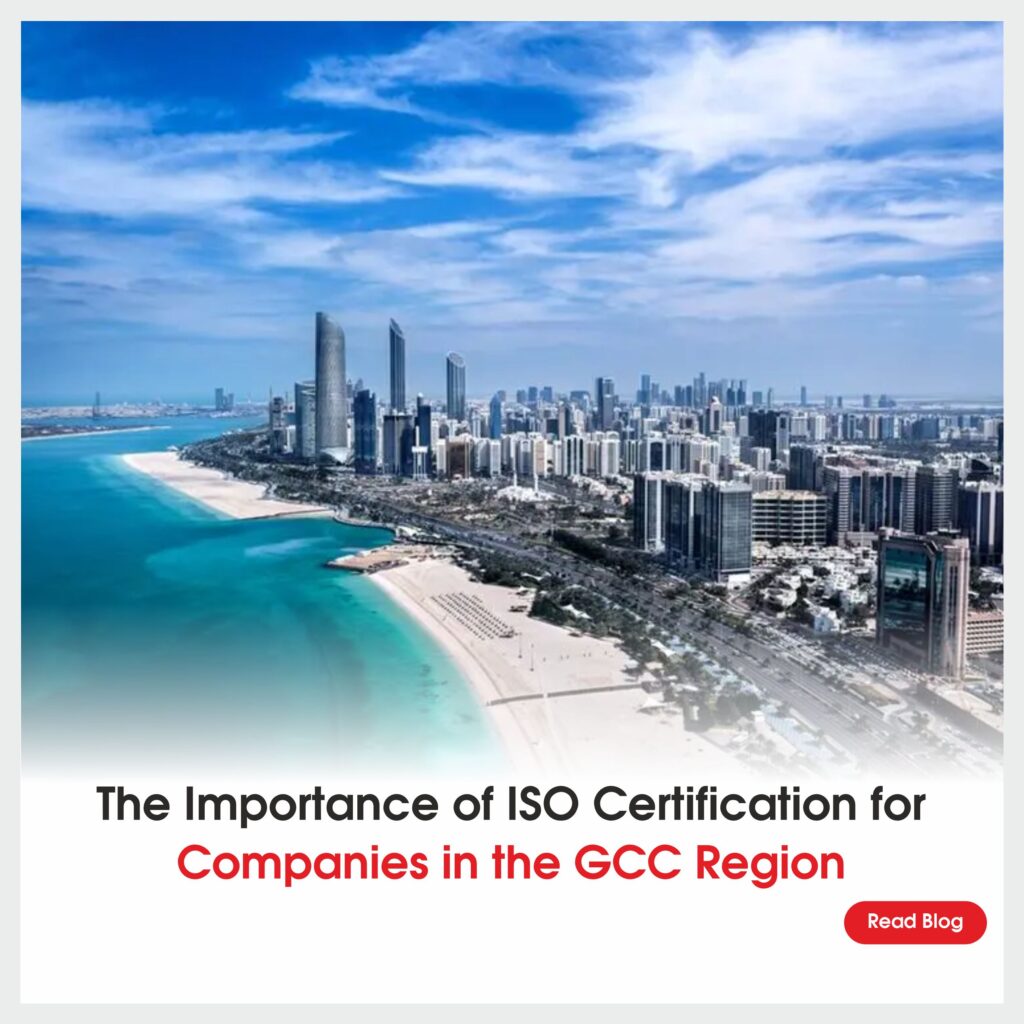
The Gulf Cooperation Council (GCC) region, which encompasses Saudi Arabia, Oman, Bahrain, Morocco, the United Arab Emirates (UAE), Kuwait, and Qatar has established itself as a center of economic growth and commercial innovation. In this dynamic scenario, ISO certification plays an essential role in achieving organizational excellence, creating international trust, and maintaining long-term competitiveness. Understanding ISO Certification ISO (International Organization for Standardization) is an independent non-governmental organization that establishes worldwide standards to ensure the quality, safety, and efficiency of goods, services, and systems. Obtaining ISO certification demonstrates that a company follows globally recognized best practices, which is essential in a region as interconnected and competitive as the GCC. Why ISO Certification Matters in the GCC The GCC region has been highlighted for its numerous businesses, including oil and gas, construction, healthcare, manufacturing, and information technology. In such a competitive environment, ISO certification provides a number of advantages :- Enhanced market reputation – Companies that have achieved ISO certification receive an advantage in terms of trust and reputation. ISO certification is considered as proof of quality and dependability by clients and stakeholders. This is particularly noteworthy in nations like Saudi Arabia and the UAE, where companies frequently serve to worldwide markets. Regulatory compliance – The GCC region has rigorous regulatory structures. ISO certifications, such as ISO 9001 for Quality Management Systems and ISO 14001 for Environmental Management Systems, assist organizations in complying with local and international legislation, lowering legal risks. Operational Efficiency – ISO standards promote streamlined procedures and the elimination of inefficiencies. For example, ISO 45001 for Occupational Health and Safety Management is highly relevant in Qatar and Kuwait’s construction and oil sectors, where worker safety is essential. Access to new markets – ISO certification is sometimes necessary for international project bidding. Companies in Bahrain and Oman wishing to expand abroad benefit from ISO-certified systems, which demonstrate their dedication to quality and position them as dependable partners. Customer Satisfaction – ISO 9001, for example, emphasizes constant service quality to increase customer satisfaction. In service-driven economies such as the UAE and Qatar, meeting and exceeding consumer expectations is a requirement. Risk Management – ISO certifications, such as ISO 27001 for Information Security Management, assist organizations in reducing risks by safeguarding essential data. This is especially essential for Bahrain and Morocco’s banking and technology sectors. Key Industries Benefiting from ISO Certification in the GCC Oil & Gas – The oil and gas sector represents the backbone of the GCC economies. ISO certifications such as ISO 29001 (which applies to the petroleum, petrochemical, and natural gas industries) ensure operational integrity, safety, and environmental compliance, particularly in Saudi Arabia and Kuwait. Construction & Infrastructure – The GCC is experiencing a development boom, particularly in Qatar (owing to projects such as the FIFA World Cup 2022 Legacy) and the UAE (with a focus on smart cities). ISO 45001 and ISO 14001 certifications are required to ensure worker safety and environmental sustainability. Healthcare – With increased investments in healthcare infrastructure, particularly in Saudi Arabia and the UAE, certifications like as ISO 13485 for medical devices and ISO 15189 for medical laboratories are becoming more significant. Tourism and Hospitality – The UAE and Oman are prominent players in the worldwide tourism business. ISO 22000 for food safety management guarantees that hospitality companies provide safe and high-quality experiences for their customers. Manufacturing – Manufacturing has become more prevalent as the GCC’s economies diversify. ISO certifications, such as ISO 50001 for energy management, assist industries in Bahrain and other GCC countries for enhancing energy efficiency and reduce expenditures. The Role of ISO in Sustainability and Innovation Sustainability is a key emphasis for GCC countries, particularly through projects such as Saudi Vision 2030 and the UAE’s Net Zero by 2050 goal. ISO certificates play an important role in accomplishing these goals. Environmental Responsibility – ISO 14001 assists businesses in reducing their environmental effect, which aligns with global sustainability goals. Energy Efficiency – Standards such as ISO 50001 help businesses optimize their energy use, which is necessary for Oman and Qatar’s energy-intensive industries. Innovation and Growth – ISO certifications promote a culture of continuous improvement, which drives innovation and economic diversity. Steps to Achieve ISO Certification Obtaining ISO certification is an organized process. Identify Relevant Standards – Companies ought to select relevant standards based on their industry demands, such as ISO 9001 for quality and ISO 27001 for information security. Gap Analysis – Assess current processes against ISO standards to discover opportunities for improvement. Implement necessary changes – Create and document new procedures, train employees, and build a strong management structure. Internal Audit – Perform an internal examination to guarantee conformity before inviting an external certifying authority. Certification Audit – A recognized certification authority assesses the organization’s compliance and provides certification upon successful completion.Continuous Improvement.Maintain certification by sticking to requirements and conducting frequent surveillance audits. Selecting the Right Certification Body – The success of the certification journey is dependent on the selection of a credible certifying organization. Companies in the Gulf Cooperation Council frequently choose internationally renowned groups with a strong local presence to assure cultural and regulatory compliance. Conclusion For businesses in the GCC area, ISO certification is an effective tool to attain operational excellence, foster trust, and maintain competitiveness on an international scale. It is more than simply a badge of honor. ISO standards are essential for satisfying environmental regulations in Oman, improving consumer satisfaction in the United Arab Emirates, and guaranteeing safety in Saudi Arabia’s oilfields. Obtaining ISO certification is an investment in the future for companies in the GCC. It emphasizes a dedication to sustainability, innovation, and quality—values that appeal to stakeholders everywhere. Businesses may successfully negotiate the difficulties of a constantly changing global market by adopting ISO standards, which will guarantee long-term profitability and expansion.
ISO 21001 Non Conformity: What No One Is Talking About

What is ISO 21001:2018? ISO 21001:2018 is a management system standard designed primarily for educational enterprises. It creates a framework for an effective Educational Organizational Management System (EOMS) that improves learning outcomes and institutional performance. The primary goal is to offer a framework for businesses to develop, deploy, maintain, and improve management systems. What is ISO 21001:2018 Non Conformity? ISO 21001:2018 Non-Conformity refers to any divergence from the criteria established in the ISO 21001 standard, which focuses on educational management systems. When a company fails to achieve these criteria, it can have serious consequences for quality control and stakeholder trust. Non-conformities can be caused by a variety of circumstances, including poor processes, insufficient training, or a failure to adopt appropriate paperwork. Addressing ISO 21001 non-conformity is critical for enterprises seeking excellence in education management. By discovering and correcting these inconsistencies, organizations not only increase their operational performance but also demonstrate a commitment to continuous development. This proactive approach encourages a culture of responsibility and ensures that educational programs match the highest standards. Here are some main reasons for Non-Conformities in ISO 21001:2018 ISO 21001:2018 is an international standard for educational institutions that enables them to manage and improve their educational goods and services. Non-conformities happen when an organization fails to achieve the required requirements. Understanding the underlying reasons of these nonconformances is critical for ongoing improvement and compliance. Here are some frequent reasons why nonconformities occur in ISO 21001:2018 : Lack of Stakeholder Engagement – Educational organizations frequently fail to involve all key stakeholders, such as students, parents, and instructors. Ignoring their wants and comments might lead to mismatched services and disappointing expectations. Inadequate leadership commitment – Top management may not completely commit to the ISO 21001:2018 framework, resulting in ineffective implementation and supervision. Without good leadership, procedures are frequently uneven and lacking in accountability. Poor Risk Management – Many educational institutions struggle to identify and manage risks associated with their offerings. This includes hazards to educational delivery, student happiness, and other operational issues that cause departures from the established norms. Insufficient resources and training – Non-conformities can occur when employees are not properly trained or the business fails to provide enough resources. Maintaining conformity with ISO 21001:2018 requires well-trained people. Failure to monitor and measure performance – Continuous monitoring and review are required to ensure compliance. Some businesses overlook regular performance evaluations and assessments, resulting in missed chances for growth. Ineffective communication – Poor communication within departments or with stakeholders can lead to misunderstandings or errors in executing policies and processes, resulting in nonconformities. Inconsistent documentation practices – Inconsistent or out-of-date documentation is typically the source of nonconformances. Proper record-keeping and updating documents in accordance with ISO 21001:2018 criteria is critical to preventing problems. Neglecting continuous improvement – ISO 21001:2018 promotes continual improvement, yet some businesses do not prioritize monitoring and improving their procedures. This stagnation might result in outmoded procedures and non-conformance. Lack of clear or defined objectives – Educational institutions frequently fail to establish clear, measurable objectives that are consistent with the ISO 21001:2018 framework. This lack of clarity might induce misalignment of efforts, resulting in underperformance. Ignoring feedback mechanisms – Failing to develop adequate feedback systems or ignoring input might result in reoccurring problems. Continuous learning from feedback is critical for satisfying stakeholder expectations and enhancing services. By addressing these prevalent causes, educational institutions may greatly minimize the risk of nonconformities and assure compliance with ISO 21001:2018. Regular evaluations, stakeholder participation, and continual improvement should be key to any compliance plan. TYPES OF NON-CONFORMITIES Major Non-Conformity: Major non-conformities are serious deviations from the requirements of a standard or management system. They often pose a significant risk to the organization’s objectives, compliance, or product/service quality. Major non-conformities can result in certification suspension or withdrawal in the case of ISO certification. Minor Non-Conformity: Minor non-conformities are less severe than major ones but still represent a deviation from the standard or management system’s requirements. While they may not pose an immediate or significant risk, they should be addressed to ensure compliance and continuous improvement. Observation: Observations are findings made during an audit or assessment that are not classified as non-conformities. They are typically used to report areas where the organization’s practices, processes, or documentation deviate slightly from the requirements of the relevant management system standard. The purpose of reporting observations is to bring attention to areas where improvements or adjustments could be beneficial for the organization. Opportunities for Improvement (OFI): These are specific areas within the organization’s processes or practices where enhancements or optimizations can be made. These areas may not necessarily be deviations from the standard’s requirements, but they represent chances to improve efficiency, effectiveness, or performance. How to deal with ISO 21001:2018 non-conformities? Nonconformities may result from several issues, including ineffective communication, inadequate documentation, inadequate training, motivational concerns, a lack of high-quality supplies, tools, or equipment, or an unsuitable work environment. They are frequently found by looking at data security events, client complaints, user or supplier alarms, and monitoring and measuring results that don’t satisfy the standards. It is essential to respond to nonconformity by either managing and fixing it or coping with the repercussions. The nonconformity management procedure consists of the following steps :- Identification and documentation of the nonconformity. Immediate corrective actions. Root cause analysis. Development of an action plan to implement the corrective actions. Monitoring and following up. An important part of analysing the nonconformity reaction and confirming the efficacy of the steps taken is played by management system auditors. An organization’s response to nonconformity should involve cause investigation and corrective action. Major nonconformities can arise from the total failure to meet a requirement of the standard, from the lack of required documentation, from the breakdown of a process or procedure, from the accumulation of minor nonconformities regarding a single process or element of an organization’s management system, from the misuse of a certification mark, or unresolved minor non-conformities. To avoid major nonconformities, it is essential to properly implement the standard and maintain records of
The Impact of ISO 27701 on Business Growth
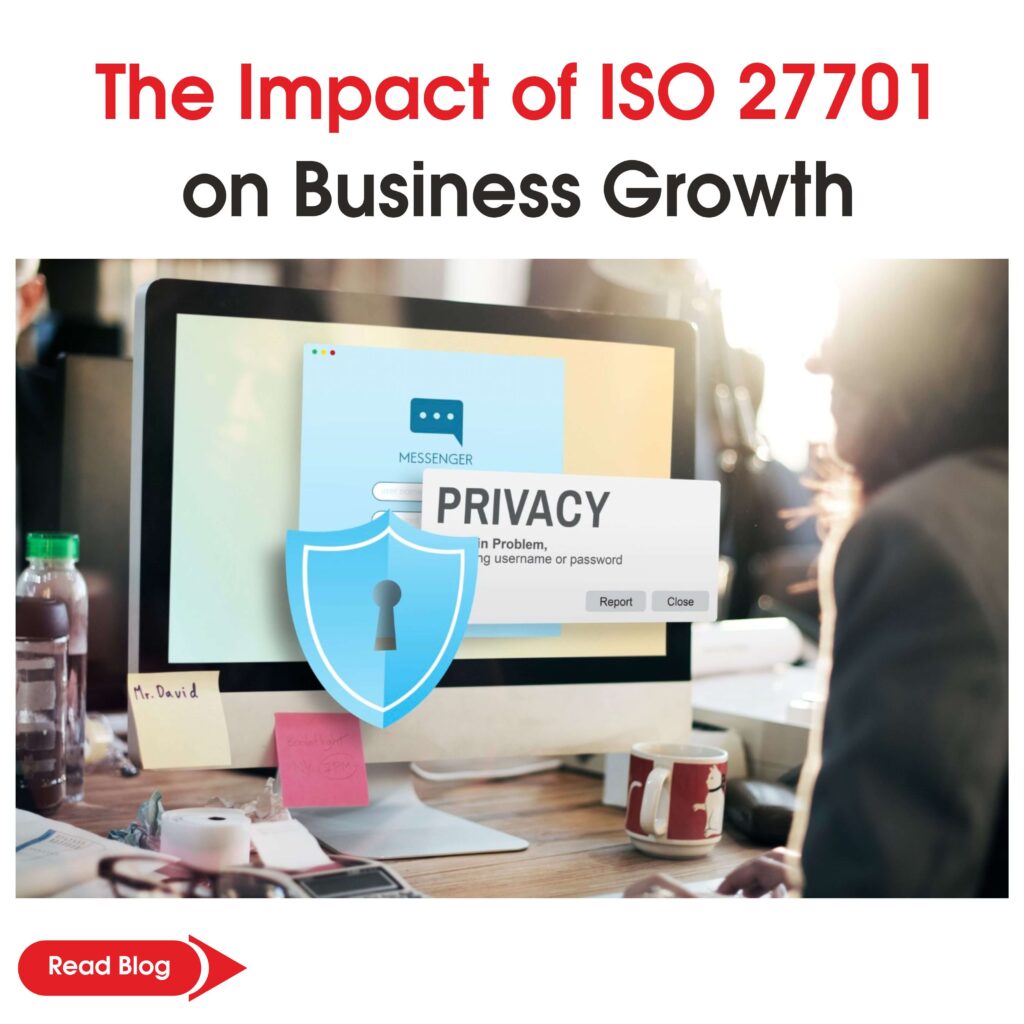
Today’s business environment cannot be overemphasized without a consideration of privacy and data protection. This is especially due to the growing importance of data privacy and regulations across the world hence the need for organizations to fully embrace proper data management. Such a framework that has emerged and has received popularity in the recent past is the ISO 27701 which is an extension of the ISO 27001 and it focuses on the requirement for PSD and aims at offering guidelines for a Privacy Information Management System or PIMS. This standard is useful in organizations’ handling of personal data besides compliance to data privacy laws such as the CMMI, SOC, GDPR. ISO/IEC 27701 does not only enhance an organization capability towards the protection of privacy but also has a central role in the advancement of the business. ISO/IEC 27701:2019 certification paves way for organizations to gain a good reputation, improve processes, and gain new business opportunities. Now let’s turn the attention to how ISO/IEC 27701 can influence business development in detail. Strengthening Trust and Enhancing Reputation with ISO/IEC 27701:2019 Certification Some of the advantages associated with the ISO 27701 certification include the ability to enhance the confidence level of the clients, partners, and stakeholders. This is especially important when companies provide service offerings in an environment where data breaches and privacy are key issues that contribute to customer trust. Certification under ISO 27701 can be evidenced as proof that your organisation is committed to the protection of individuals’ privacy and personal data. And with more trust, comes a better brand image. Organizations that meet global privacy standards such as ISO 27701 are seen as having more credibility than those that do not. This credibility can work for the benefit of your business, especially when it is competing in such sectors as healthcare, finance and Information Technology where data protection is paramount. The privacy of data not only plays an important role in acquisition of new clients but also plays an even bigger role in maintaining good relationship with the existing customers. Facilitating Compliance and Risk Mitigation Through ISO/IEC 27701:2019 Privacy Information Management System(PIMS) One other advantage it brings to business is enhancement of compliance with the privacy legislation including GDPR, CCPA or/and other international privacy laws. This serves as a checklist that enables organizations to implement systems that are in line with these laws, hence avoiding bad coping which attracts big penalties. Information security ISO 27701 provides a framework for developing, implementing and maintaining a privacy management program, that would focus on information assets and its protection from the identified risks. As of today, more companies have to deal with a vast number of data protection regulations all over the world. ISO/IEC 27701 helps to complete this task by offering a set of guidelines that may be applied in relation to different regulations. Through compliance, companies are able to save a lot of cash that they would have been used to compensate for several legal consequences, prevent several ways through which data can be leaked, and gain a good reputation. This in turn assists business to seek growth rather than to be bothered by some legal issues that might be cumbersome to sort out. Improving Operational Efficiency with ISO/IEC 27701:2019 Certification Implementing ISO/IEC 27701:2019 is not only about being compliant but also about boosting performance. A Privacy Information Management System (PIMS) is beneficial to organizations as it enables them to become more efficient within the handling of personal data through the elimination of unnecessary activities and control of the data throughout its whole duration. Having proper policies and procedures eliminates the problem of working in silos that may result to multiplicity of efforts, lack of standardization, employee misconduct or negligence that compromises the security of the data. This results in increased efficiency which reduces on time and resources that could be used in other growth-oriented activities. Also, ISO 27701 guarantees the development of a private culture in an organization. This way, the employees are aware of the part they play in the protection of personal data with the result that there are fewer errors and more timely discovery of threats to privacy. It can also unveil possibilities of improving productivity of the organization and aid in making the organizational culture to run more efficiently. Unlocking Global Opportunities with ISO/IEC 27701:2019 Certification With globalization the corporate environment comes across a number of privacy laws and data protection laws. Global recognition – Organizations with ISO 27701 certification are easily recognizable in the global market and can conveniently make establishment in the international market and engage in business with international players. For any organizations desiring to go global or engage in international operations, ISO 27701 comes in handy as a means to prove compliance with different regional privacy regulations on the international market. In turns informs your global partners and customers that your organization is fully compliant to the recommended standards in management of their privacy thus inspiring confidence in you hence letting business to proceed with ease. At times, ISO 27701 becomes mandatory for organizations before engaging in contracts or business deals with clients across the globe particularly in cloud solutions, Information Technology industries as well as in the health sector. Adhering to these global standards places your business in a good stead to optimize for new sources of revenues and growth beyond the domestic market. Boosting Client Acquisition and Retention with ISO 27701 Certification Boosting Client Acquisition and Retention with ISO 27701 Certification With the increase in business competition today, it can be very difficult to establish and maintain customer relations particularly so for organizations that deal with the collection and processing of personal data. ISO 27701 certification is beneficial to organizations in the market since it is evidence of compliance with the protection of client information. Clients are more aware of their data privacy regulation and rights, and it is high time that all the organizations followed the same and protected their data.
